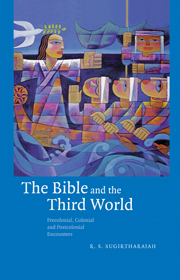Book contents
- Frontmatter
- Contents
- Acknowledgements
- 1 Introduction
- PART I PRECOLONIAL RECEPTION
- PART II COLONIAL EMBRACE
- PART III POSTCOLONIAL RECLAMATIONS
- 6 Desperately seeking the indigene: nativism and vernacular hermeneutics
- 7 Engaging liberation: texts as a vehicle of emancipation
- 8 Postcolonializing biblical interpretation
- Afterword
- Select bibliography
- Index of biblical references
- Index of names and subjects
8 - Postcolonializing biblical interpretation
Published online by Cambridge University Press: 02 December 2009
- Frontmatter
- Contents
- Acknowledgements
- 1 Introduction
- PART I PRECOLONIAL RECEPTION
- PART II COLONIAL EMBRACE
- PART III POSTCOLONIAL RECLAMATIONS
- 6 Desperately seeking the indigene: nativism and vernacular hermeneutics
- 7 Engaging liberation: texts as a vehicle of emancipation
- 8 Postcolonializing biblical interpretation
- Afterword
- Select bibliography
- Index of biblical references
- Index of names and subjects
Summary
If post-modernism is at least partially about 'how the world dreams itself to be “American”, then, post-colonialism is about waking from that dream, and learning to dream otherwise.
Diana BrydonIn life one must for ever choose between being one who tells stories and one about whom stories are told.
Shashi TharoorUntil now liberation hermeneutics has been seen as the distinctive contribution of Third World biblical interpreters. Recently another critical category, postcolonialism, has emerged as its rival, and has staked a claim to represent minority voices. On the face of it, both liberation hermeneutics and postcolonialism share a common interpretative vocation – for instance, deideologizing dominant interpretation, a commitment to the Other and distrust of totalizing tendencies. However, a closer look in the last chapter revealed that liberation hermeneutics is still stuck with some of the vices of the modernistic project – excessive textualism, disparagement of both major and popular religions and homogenization of the poor. Also it seems shy about breaking with them. What I propose to do first in this chapter is to delineate the characteristics of the new entrant to the critical arena – postcolonialism – and outline some of its theoretical and praxiological intentions and assumptions; second, to deal with the applicability of postcolonialism to biblical studies; and third, to map out the affinities and differences between postcolonialism and liberation hermeneutics. In the concluding part I will try to answer some of the questions constantly asked about postcolonialism, and I will end with my own qualified support for the theory.
- Type
- Chapter
- Information
- The Bible and the Third WorldPrecolonial, Colonial and Postcolonial Encounters, pp. 244 - 275Publisher: Cambridge University PressPrint publication year: 2001



